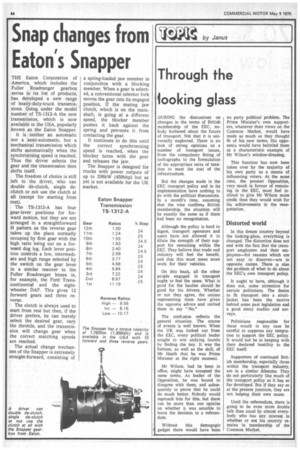Through the looking glass
Page 34

If you've noticed an error in this article please click here to report it so we can fix it.
DURING the discussions on changes in the terms of British membership of the EEC, nobody bothered about the future of transport. Not that it is universally neglected. There is no lack of strong opinions on a number of transport issues, from the compulsory fitting of tachographs to the formulation of the appropriate rates of taxation to meet the cost of the infrastructure.
But the changes made in the EEC transport policy and in its implementation have nothing to do with the political discussions. In a month's time, assuming that the vote confirms British membership, the situation will be exactly the same as if there had been no renegotiation.
Although the policy is hard to digest, transport operators and users have not allowed it to dilute the strength of their support for remaining within the EEC. They believe that trade and industry will feel the benefit, and that this must mean more work for their vehicles.
On this basis, all the other people engaged in transport ought to feel the same. What is good for the haulier should be good for his drivers. Whether or not they agree, the unions representing them have given the opposite advice and invited them to say "No."
The confusion reflects the general situation. The course of events is well known. When the UK was locked out from the EEC, every political leader sought to win undying laurels by finding the key. It was the fortune, as well as the skill, of Mr Heath that he was Prime Minister at the right moment.
Mr Wilson, had he been in office, might have accepted the same terms. As leader of the Opposition, he was bound to disagree with them, and subsequently to prove that he could do much better. Nobody would reproach him for this, but there can be more than one opinion on whether it was sensible to leave the decision to a referendum.
Without this demagogic gadget there would have been no party political problem. The Prime Minister's own supporters, whatever their views on the Common Market, would have made as much as they thought fit of his new terms. His opponents would have belittled them as a characteristic example of Mr Wilson's window-dressing.
This function has now been taken over by the majority of his own party as a means of influencing voters. At the same time, the present Opposition, very much in favour of remaining in the EEC, must feel inclined to give Mr Wilson more credit than they would wish for his achievements in the reneg otia t ion.
Distorted world
In this dream country beyond the looking-glass, everything is changed. The distortion does not end with the fact that the transport employers and their employees—for reasons which are not easy to discover—are in opposite camps. There is also the problem of what to do about the EEC's own transport policy.
It ought to have, although it does not, some attraction for certain politicians. The desire to fit transport into a straitjacket has been the motive behind some past legislation and a good many studies and surveys.
Politicians responsible for these would in any case be careful to suppress any temptation to support the EEC policy. It would not be in keeping with their declared hostility to the EEC itself.
Supporters of continued British membership, especially those within the transport industry, are in a similar dilemma. They do not particularly like much of the transport policy as it has so far developed. But if they say so at the present juncture, they are not helping their own cause.
Until the referendum, there is going to be even more double talk than usual by almost everybody who has any interest in whether or not his country remains in membership of the Common Market.




























































































































































